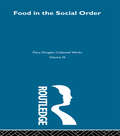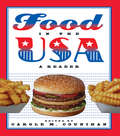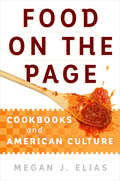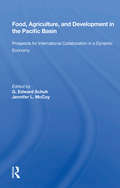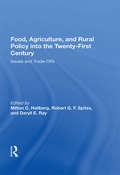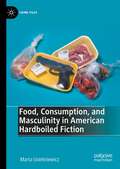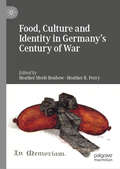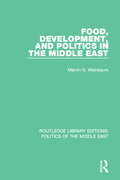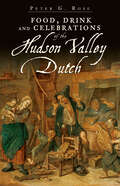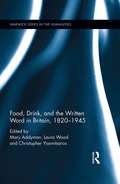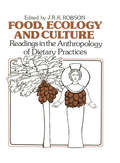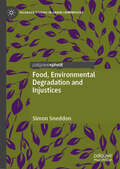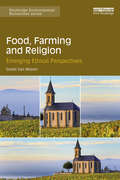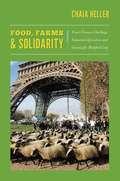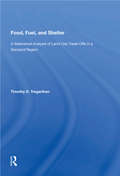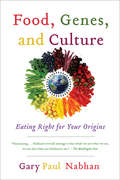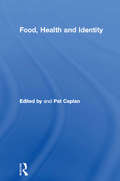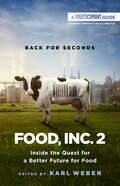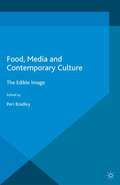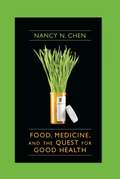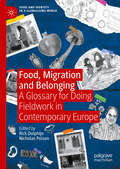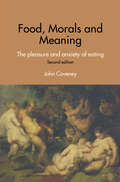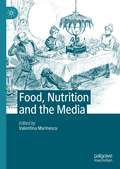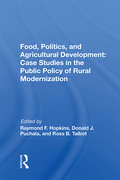- Table View
- List View
Food in the Social Order
by Mary DouglasFirst published in 1984, This work is a cross-cultural study of the moral and social meaning of food. It is a collection of articles by Douglas and her colleagues covering the food system of the Oglala Sioux, the food habits of families in rural North Carolina, meal formats in an Italian-American community near Philadelphia. It also includes a grid/group analysis of food consumption.
Food in the USA: A Reader
by Carole M. CounihanFrom Thanksgiving to fast food to the Passover seder, Food in the USA brings together the essential readings on these topics and is the only substantial collection of essays on food and culture in the United States. Essay topics include the globalization of U.S. food; the dangers of the meatpacking industry; the rise of Italian-American food; the meaning of Soul food; the anorexia epidemic; the omnipotence of Coca-Cola; and the invention of Thanksgiving. Together, the collection provides a fascinating look at how and why we Americans are what we eat.
Food on the Page: Cookbooks and American Culture
by Megan J. EliasWhat is American food? From barbecue to Jell-O molds to burrito bowls, its history spans a vast patchwork of traditions, crazes, and quirks. A close look at these foods and the recipes behind them unearths a vivid map of American foodways: how Americans thought about food, how they described it, and what foods were in and out of style at different times.In Food on the Page, the first comprehensive history of American cookbooks, Megan J. Elias chronicles cookbook publishing from the early 1800s to the present day. Following food writing through trends such as the Southern nostalgia that emerged in the late nineteenth century, the Francophilia of the 1940s, countercultural cooking in the 1970s, and today's cult of locally sourced ingredients, she reveals that what we read about food influences us just as much as what we taste.Examining a wealth of fascinating archival material—and rediscovering several all-American culinary delicacies and oddities in the process—Elias explores the role words play in the creation of taste on both a personal and a national level. From Fannie Farmer to The Joy of Cooking to food blogs, she argues, American cookbook writers have commented on national cuisine while tempting their readers to the table. By taking cookbooks seriously as a genre and by tracing their genealogy, Food on the Page explains where contemporary assumptions about American food came from and where they might lead.
Food, Agriculture, And Development In The Pacific Basin: Prospects For International Collaboration In A Dynamic Economy
by G. Edward SchuhThis book is concerned with the management of food production and the distribution of food in the Pacific Basin, exploring food's potential for engendering both increased conflict and cooperation in the region. The authors begin by discussing the role of food and agriculture in the international economy and the implications of two contrasting approaches to food security: international trade and self-sufficiency. They also consider the problem of international migration of labor in the region and look at how agriculture can contribute to the development of the economy in individual countries. The book concludes with a discussion of the prospects for international collaboration in dealing with the domestic and international adjustments required to enhance overall growth and equity in food supply and distribution.
Food, Agriculture, And Rural Policy Into The Twenty-first Century: Issues And Trade-offs
by Milton C. Hallberg Robert G. F. Spitze Daryll E. RayThis book contributes to 1995 policymaking by offering information concerning an array of issues fundamentally important to the U.S. agricultural and food sector. It reviews a set of policy approaches for dealing with these issues, and assesses trade-offs among these alternative approaches.
Food, Consumption, and Masculinity in American Hardboiled Fiction (Crime Files)
by Marta UsiekniewiczFood, Consumption, and Masculinity in American Hardboiled Fiction draws on three related bodies of knowledge: crime fiction criticism, masculinity studies, and the cultural analysis of food and consumption practices from a critical eating studies perspective. In particular, this book focuses on food as an analytical category in the study of tough masculinity as represented in American hardboiled fiction. Through an examination of six American novels: Dashiell Hammett's The Maltese Falcon, Raymond Chandler's The Big Sleep, Leigh Brackett's No Good from a Corpse, Dorothy B. Hughes's In a Lonely Place, Jim Thompson's The Killer Inside Me, and Rex Stout's Champagne for One, this book shows how these novels reflect the gradual process of redefining consumption and consumerism in America, which traditionally has been coded as feminine. Marta Usiekniewicz shows that food and eating also reflect power relations and larger social and economic structures connected to class, gender, geography, sexuality, and ability, to name just a few.
Food, Culture and Identity in Germany's Century of War
by Heather Merle Benbow Heather R. PerryEven in the harsh conditions of total war, food is much more than a daily necessity, however scarce—it is social glue and an identity marker, a form of power and a weapon of war. This collection examines the significance of food and hunger in Germany’s turbulent twentieth century. Food-centered perspectives and experiences “from below” reveal the social, cultural and political consequences of three conflicts that defined the twentieth century: the First and Second World Wars and the ensuing global Cold War. Emerging and established scholars examine the analytical salience of food in the context of twentieth-century Germany while pushing conventional temporal frameworks and disciplinary boundaries. Together, these chapters interrogate the ways in which deeper studies of food culture in Germany can shed new light on old wars.
Food, Development, and Politics in the Middle East (Routledge Library Editions: Politics of the Middle East #11)
by Marvin G. WeinbaumAs the reality of a food deficit emerged in the Middle East, rural society and the agricultural sector – once viewed as peripheral to national development – swiftly rose up the policy agendas of nearly every Middle East country. This book, first published in 1982, looks at the complex interrelationships of food production, development schemes and politics in those countries. Dr Weinbaum considers the origins, nature, scope and political dimensions of the potential food shortfall and explores how food deficits could lead to changed international relations among states in the Middle East. He specifically examines the physical and technological limitations to increased food production, then assesses the major social, economic and political hurdles in the way of agricultural development, the effects of – and pressures for – agrarian reform, the bureaucratic policymaking process, and the domestic impact of foreign assistance policies. He concludes with an examination of the linkage between food supply availability and political stability.
Food, Drink and Celebrations of the Hudson Valley Dutch (American Palate)
by Peter G RoseThe renowned food historian delves into the early culinary traditions of Dutch settlers in New York state and their influence on the American kitchen.In 1609, Henry Hudson, under contract with the Dutch East India Company, set out to discover the lucrative Northwest Passage. The Hudson River Valley is what he discovered instead, and along its banks Dutch culture took hold. While the Dutch influence can still be seen in local architecture and customs, it is food and drink that Peter Rose has made her life&’s work. From beer to bread and cookies to coleslaw, Food, Drink and Celebrations of the Hudson Valley Dutch is a comprehensive look at this important early American influence, complete with recipes to try.
Food, Drink, and the Written Word in Britain, 1820-1945 (Warwick Series in the Humanities)
by Laura Wood Mary Addyman Christopher YiannitsarosThis volume explores the intersection between culinary history and literature across a period of profound social and cultural change. Split into four parts, essays focus on the relationships between eating and childhood reading in the Victorian era, the role of hunger in depicting social instability and reform, the cultivation of taste through advertising and the formation of cultural legacies through imaginative and emotional experiences of food and drink. Contributors show that studying consumption is necessary for a full understanding of class, gender, national identity and the body. The works of writers such as Elizabeth Gaskell, Edward Lear, Isabella Beeton and Bram Stoker are considered alongside advice manuals, Home Front narratives and advertising to provide an innovative work that will be of interest to scholars of social, cultural and medical history as well as literary studies.
Food, Ecology and Culture: Readings in the Anthropology of Dietary Practices (Food and Nutrition in History and Anthropology)
by J. R. K. RobsonFirst published in 1980. Routledge is an imprint of Taylor & Francis, an informa company.
Food, Environmental Degradation and Injustices: How the Way We Eat Will Destroy Us (Palgrave Studies in Green Criminology)
by Simon SneddonWhat if the global trade in key food commodities suddenly ceased? This book takes readers on a thought-provoking journey through the environmental, ethical, and social justice issues embedded in our food systems. From meat and seafood to staple crops like tomatoes, potatoes, palm oil, and soya, it explores how industrial agriculture and aquaculture drive deforestation, biodiversity loss, labour exploitation, and species injustice. Drawing on green criminology and eco-justice principles, the book uncovers how corporations, weak regulations, and economic inequalities sustain harmful practices—often legally sanctioned but morally indefensible. Through an innovative &“what-if&” approach, it challenges readers to rethink the true cost of their food and the power of their choices. This compelling book is essential reading for anyone concerned with sustainability, corporate accountability, and the future of global food production.
Food, Farming and Religion: Emerging Ethical Perspectives (Routledge Environmental Humanities)
by Gretel Van WierenAlthough the religious and ethical consideration of food and eating is not a new phenomenon, the debate about food and eating today is distinctly different from most of what has preceded it in the history of Western culture. Yet the field of environmental ethics, especially religious approaches to environmental ethics, has been slow to see food and agriculture as topics worthy of analysis. This book examines how religious traditions and communities in the United States and beyond are responding to critical environmental ethical issues posed by the global food system. In particular, it looks at the responses that have developed within Jewish, Christian, and Islamic traditions, and shows how they relate to arguments and approaches in the broader study of food and environmental ethics. It considers topics such as land degradation and restoration, genetically modified organisms and seed consolidation, animal welfare, water use, access, pollution, and climate, and weaves consideration of human wellbeing and justice throughout. In doing so, Gretel Van Wieren proposes a model for conceptualizing agricultural and food practices in sacred terms. This book will appeal to a wide and interdisciplinary audience including those interested in environment and sustainability, food studies, ethics, and religion.
Food, Farms, and Solidarity: French Farmers Challenge Industrial Agriculture and Genetically Modified Crops (New ecologies for the twenty-first century)
by Chaia HellerThe Confédération Paysanne, one of France's largest farmers' unions, has successfully fought against genetically modified organisms (GMOs), but unlike other allied movements, theirs has been led by producers rather than consumers. In Food, Farms, and Solidarity, Chaia Heller analyzes the group's complex strategies and campaigns, including a call for a Europe-wide ban on GM crops and hormone-treated beef, and a protest staged at a McDonald's. Her study of the Confédération Paysanne shows the challenges small farms face in a postindustrial agricultural world. Heller also reveals how the language the union uses to argue against GMOs encompasses more than the risks they pose; emphasizing solidarity has allowed farmers to focus on food as a cultural practice and align themselves with other workers. Heller's examination of the Confédération Paysanne's commitment to a vision of alter-globalization, the idea of substantive alternatives to neoliberal globalization, demonstrates how ecological and social justice can be restored in the world.
Food, Fuel & Shelter/h
by Timothy D. TregarthenAs human pressures on land intensify, land-use decisions in response to the new demands become increasingly critical. Thus, the fate of the little-known Running Creek Watershed assumes a broad importance. Running Creek Watershed is a 150-kilometer strip of land lying just east of the rapidly expanding urban corridor of Colorado's front range. The land in the watershed is devoted primarily to the production of food, and includes pasture, dry crop, and irrigated crop operations. Two sources of demand suggest dramatic future changes in this land-use pattern: advancing urbanization, and energy demands for the coal available in a large deposit 25 kilometers east of Denver. In this volume Timothy Tregarthen presents a synthesis of discussions and papers presented at a 1976 conference that focused on the trade-offs implicit in the land-use alternatives of food production, urbanization, and energy development. Sponsored by the Wright-Ingraham Institute, the conference brought together a wide range of scientists, humanists, public officials, representatives of industrial and agricultural organizations, and interested citizens concerned not only about this important regional problem, but about the broader implications of competing land-use needs. Conference participants examined factors important to changes in land use, giving particular attention to the natural, economic, political, and value systems at work on the watershed in terms of how these systems affect and will be affected by changing land-use patterns.
Food, Genes, and Culture: Eating Right for Your Origin
by Gary Paul NabhanVegan, low fat, low carb, slow carb: Every diet seems to promise a one-size-fits-all solution to health. But they ignore the diversity of human genes and how they interact with what we eat. In Food, Genes, and Culture, renowned ethnobotanist Gary Nabhan shows why the perfect diet for one person could be disastrous for another. If your ancestors were herders in Northern Europe, milk might well provide you with important nutrients, whereas if you're Native American, you have a higher likelihood of lactose intolerance. If your roots lie in the Greek islands, the acclaimed Mediterranean diet might save your heart; if not, all that olive oil could just give you stomach cramps. Nabhan traces food traditions around the world, from Bali to Mexico, uncovering the links between ancestry and individual responses to food. The implications go well beyond personal taste. Today's widespread mismatch between diet and genes is leading to serious health conditions, including a dramatic growth over the last 50 years in auto-immune and inflammatory diseases. Readers will not only learn why diabetes is running rampant among indigenous peoples and heart disease has risen among those of northern European descent, but may find the path to their own perfect diet.
Food, Health and Identity
by Pat CaplanBy addressing the issue of food and eating in Britain today this collection considers the ways in which food habits are changing and shows how social and personal identities and perceptions of health risk influence people's food choices.The articles explore, among other issues:• the family meal• wedding cakes• nostalgia and the invention of tradition• the rise of vegetarianism• the recent BSE crisis• the `creolization' of British food eating out• creation of individual identity through lifestyle.The contributors include Hanna Bradby, Simon Charsley, Allison James, Anne Keane, Lydia Martens and Alan Warde.
Food, Inc. 2: Inside the Quest for a Better Future for Food
by Participant and Karl WeberAn eye-opening guide to how America feeds itself and an essential companion book to the new documentary America&’s food system is broken, harming family farmers, workers, the environment, and our health. But it doesn&’t have to be this way. Here, brilliant innovators, scientists, journalists and activists explain how we can create a hopeful new future for food, if we have the courage to seize the moment. In 2008, the award-winning documentary Food, Inc. shook up our perceptions of what we ate. Now, the movie&’s timely sequel and this new companion book will address the remarkable developments in the world of food—from lab-grown meat to the burgeoning food sovereignty movement—that have unfolded since then. Featuring thought-provoking original essays from: Michael Pollan • Eric Schlosser • David E. Kelley and Andrew Zimmern • Senator Cory Booker • Sarah E. Lloyd • Carlos A. Monteiro and Geoffrey Cannon • Lisa Elaine Held • Larissa Zimberoff • Saru Jayaraman • Christiana Musk • Nancy Easton • Leah Penniman • David LeZaks and Lauren Manning • The Coalition of Immokalee Workers • Michiel Bakker • Danielle Nierenberg This book is the perfect roadmap to understanding not only our current dysfunctional food system, but also what each of us can do to help reform it.
Food, Media and Contemporary Culture: The Edible Image
by Peri BradleyFood, Media and Contemporary Culture is designed to interrogate the cultural fascination with food as the focus of a growing number of visual texts that reveal the deep, psychological relationship that each of us has with rituals of preparing, presenting and consuming food and images of food.
Food, Medicine, and the Quest for Good Health
by Chen Nancy N.Drawing on medical texts and food therapy practices from around the world and throughout history, Nancy N. Chen locates old and new crossovers between food and medicine in different social and cultural contexts.
Food, Migration and Belonging: A Glossary for Doing Fieldwork in Contemporary Europe (Food and Identity in a Globalising World)
by Rick Dolphijn Nicholas PolsonThis book maps the concepts that capture changing alimentary practices, starting from the impact of migration on contemporary Europe. Our relationship with food, the members of our community with whom we share our meals, and the fertile earth, is changing fast in these times of migration and globalization. The book shows how these practices give form to a (new) world, while outlining a refreshing overview of the social and political realities that sign the times. Written by academics from both the social sciences and the humanities, together with activists, policy makers, migrants, artists and chefs, every contribution is deeply entangled with the changing realities of everyday life today.
Food, Morals and Meaning: The Pleasure and Anxiety of Eating
by John CoveneyFirst published in 2006. Food, Morals and Meaning examines our need to discipline our desires, our appetites and our pleasures at the table. However, instead of seeing this discipline as dominant or oppressive it argues that a rationalisation of pleasure plays a positive role in our lives, allowing us to better understand who we are. The book begins by exploring the way that concerns about food, the body and pleasure were prefigured in antiquity and then how these concerns were recast in early Christianity as problems of 'natural' appetite which had to be curbed. The following chapters discuss how scientific knowledge about food was constructed out of philosophical and religious concerns about indulgence and excess in 18th and 19th Century Europe. Finally, by using research collected from in-depth interviews with families, the last section focuses on the social organisation of food in the modern home to illustrate the ways that the meal table now incorporates the principles of nutrition as a form of moral training, especially for children. Food, Morals and Meaning will be essential reading for those studying nutrition, public health, sociology of health and illness and sociology of the body.
Food, National Identity and Nationalism: From Everyday to Global Politics
by Atsuko Ichijo Ronald RantaExploring a much neglected area, the relationship between food and nationalism, this book examines a number of case studies at various levels of political analysis to show how useful the food and nationalism axis can be in the study of politics.
Food, Nutrition and the Media
by Valentina MarinescuPlaced at the crossroads of diverse disciplines – medical sciences, information and communication science, sociology of food, agricultural sciences – this book focuses on media, food and nutrition. Contributors to this volume come from different countries including the United Kingdom, Germany, Mexico and Romania, and consider comparatively their native cultures. The book answers several questions: How are food and nutrition made visible and publicized? What is the role of media in relation to food and nutrition? What are the strategies of discourses surrounding food and nutrition within new public spaces?
Food, Politics, And Agricultural Development: Case Studies In The Public Policy Of Rural Modernization
by Donald J. Puchala Raymond F. Hopkins Ross B. TalbotThis collection of studies on the politics of agricultural development in regions of Asia and Africa emphasizes the need for steady and significant increases in food production in the developing countries. It is a set of exercises in the comparative analysis of agricultural modernization policies.
